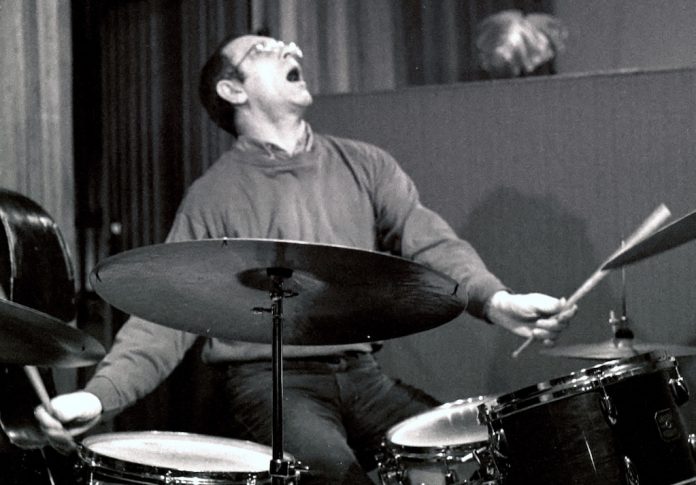
Eberhard Weber’s Colours/Stinky Winkles
Weber’s quartet fit all too easily into what has become known as the ‘ECM sound’. The group create moody and impressionistic soundscapes, delivered with a cool and dispassionate virtuosity, rock inflected, without swing, but with a strong emphasis on improvisation.
What their set lacked was any real punch, although the excellent drumming of John Marshall and the angular and bop-tinged soprano sax work by Charlie Mariano did help to counteract the more benign sounds of Weber’s upright electric bass and Brüninghaus’s often lushly romantic piano. There were good moments – especially on the leader’s Seriously Deep composition – but few risks were taken and thus few surprises heard.
The support band, Stinky Winkles, are an above average example of Brit fusion music and they played a set with much youthful energy. They were loose and dynamic, though they tend to mistake aggression for passion. Their attempt to incorporate the vocalese of Greg Bright was a total disaster, but there were several impressive moments of group interplay and solid solo work from pianist Veryan Weston and guitarist Gary Peters.
Matthew Bateson
McCoy Tyner Sextet and the Weller/Spring Quartet
The McCoy Tyner Sextet proved to be something of a let down; and curiously brief into the bargain. An astonishingly youthful looking drummer aside, George A. Johnson, Tyner’s musicians – Jose Ford (reeds), Carl Ector (vln), Avery Sharpe (bs), and the almost comically terpsichorean Guilherme Franco (per) – were fairly unremarkable.
I couldn’t escape the feeling it was all some kind of an emotional con job, trading on the last knockings of all that late 60s spiritual energy bullshit
Apart from the encore, Impressions, and a driving trio feature on another Trane tune, Moment’s Notice, which made one wonder why Tyner had bothered to bring the other three, the two other themes, one-chord, compound-time efforts in the time-honoured and now thoroughly tedious post Coltrane mould, were totally unmemorable, stimulating little from the two front men.
Each of the arrangements led inexorably to the Tyner climax and there is no denying the huge emotional power of the man and those damned ‘shifting modal patterns’, to quote the programme note quoting Balliet. But I couldn’t escape the feeling it was all some kind of an emotional con job, trading on the last knockings of all that late 60s spiritual energy bullshit.
Weller/Spring’s area of activity – bebop with knobs on – seemed to me to be far more interesting, and if their performance was a trifle muted the infrequency of their gigs goes a long way to explaining why.
Martin Blackwell gets stronger each time I hear him, with each note seeming to stand out in tiny pools of silence all of its own, and Roy Babbington’s bass harmonics, in Young Mums expecially, were fascinating. A splendid band.
Christopher Bird















